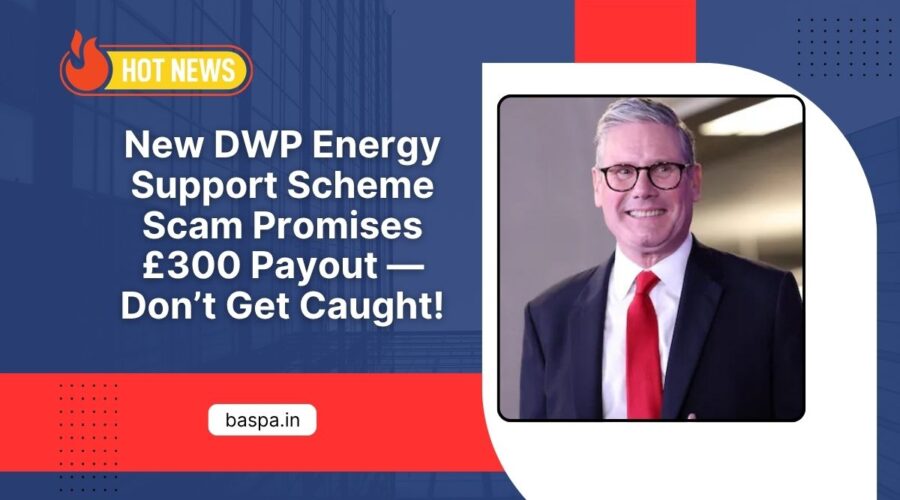New DWP Energy Support Scheme Scam Promises £300 Payout — Don’t Get Caught!
A new scam is circulating in the UK, targeting benefit claimants with fraudulent messages promising a £200–£300 energy support grant. These messages, masquerading as official communications from the Department for Work and Pensions (DWP), urge recipients to apply before an imminent deadline.
This article delves into the details of this scam, highlighting red flags, providing guidance on how to protect yourself, and outlining steps to report such fraudulent activities.
Understanding the Scam
The fraudulent messages claim that recipients are eligible for an “Energy Support Scheme” grant ranging from £200 to £300. They often state that the recipient has not yet submitted their application for the 2024–2025 fiscal year allowance and must do so by a specific date, typically June 6 or 7.
The messages create a sense of urgency, warning that late applications will not be accepted and the application channel will be permanently closed.
A common tactic used in these scams is directing recipients to a suspicious website link ending in “.ly” instead of the official “.gov.uk” domain.
Once on the site, users are prompted to provide personal and financial information and may be asked to pay a nominal fee of £1 to process the application. This fee is a ploy to harvest bank details and other sensitive information.
Red Flags to Watch Out For
It’s crucial to recognize the warning signs of such scams to protect yourself and others:
| Red Flag | Explanation |
|---|---|
| Unsolicited Messages | Receiving unexpected texts or emails claiming to be from the DWP. |
| Urgent Deadlines | Messages pressuring you to act immediately or risk losing out. |
| Suspicious Links | URLs that do not end with “.gov.uk”, especially those ending in “.ly”. |
| Request for Payment | Being asked to pay a fee to process an application for a government grant. |
| Personal Information Requests | Prompts to enter sensitive data like bank details, National Insurance numbers, or passwords. |
Official DWP Communication Practices
Understanding how the DWP communicates can help you identify fraudulent messages:
- Official Channels: The DWP typically contacts individuals through letters, official emails, or verified phone numbers.
- No Upfront Fees: The DWP does not charge fees for processing benefit applications or grants.
- No Urgent Deadlines via Text: Official communications will not pressure you with immediate deadlines via text messages.
- Secure Websites: Any official online services will be hosted on “.gov.uk” domains.
How to Protect Yourself
If you receive a suspicious message:
- Do Not Click Links: Avoid clicking on any links in unsolicited messages.
- Do Not Share Personal Information: Never provide personal or financial details in response to unexpected messages.
- Report the Message: Forward the suspicious text to 7726, a free service that allows your mobile provider to investigate and block malicious numbers.
- Contact the DWP Directly: If in doubt, contact the DWP through official channels to verify any communications.
- Inform Others: Share information about the scam with friends and family, especially those who may be more vulnerable.
Reporting Scams
Taking action against scams helps protect the wider community:
- Forward Suspicious Texts: Send the message to 7726. This service is free and helps mobile providers take action against malicious numbers.
- Report to National Cyber Security Centre (NCSC): Email suspicious emails or details of scam websites to report@phishing.gov.uk.
- Contact Action Fraud: If you’ve been a victim of a scam, report it to Action Fraud at www.actionfraud.police.uk or call 0300 123 2040.
Scammers are becoming increasingly sophisticated, using official-sounding messages to deceive individuals into providing personal and financial information.
By staying vigilant, recognizing the red flags, and knowing how the DWP communicates, you can protect yourself and others from falling victim to these scams.
Always verify unexpected messages and report any suspicious activity to the appropriate authorities.
FAQs
Is the DWP offering a £300 Energy Support Scheme grant?
No, the DWP is not offering such a grant. Any messages claiming this are fraudulent.
What should I do if I’ve already provided my details to a suspected scam?
Immediately contact your bank to secure your accounts and report the incident to Action Fraud.
How can I verify if a message from the DWP is genuine?
Contact the DWP directly through official channels listed on the GOV.UK website to verify any communications.

Leave a Reply Cancel reply